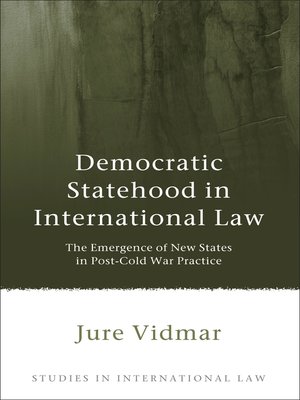Democratic Statehood in International Law
ebook ∣ The Emergence of New States in Post-Cold War Practice · Studies in International Law
By Jure Vidmar

Sign up to save your library
With an OverDrive account, you can save your favorite libraries for at-a-glance information about availability. Find out more about OverDrive accounts.
Find this title in Libby, the library reading app by OverDrive.



Search for a digital library with this title
Title found at these libraries:
| Library Name | Distance |
|---|---|
| Loading... |
This book analyses the emerging practice in the post-Cold War era of the creation of a democratic political system along with the creation of new states. The existing literature either tends to conflate self-determination and democracy or dismisses the legal relevance of the emerging practice on the basis that democracy is not a statehood criterion. Such arguments are simplistic. The statehood criteria in contemporary international law are largely irrelevant and do not automatically or self-evidently determine whether or not an entity has emerged as a new state. The question to be asked, therefore, is not whether democracy has become a statehood criterion. The emergence of new states is rather a law-governed political process in which certain requirements regarding the type of a government may be imposed internationally. And in this process the introduction of a democratic political system is equally as relevant or irrelevant as the statehood criteria. The book demonstrates that via the right of self-determination the law of statehood requires state creation to be a democratic process, but that this requirement should not be interpreted too broadly. The democratic process in this context governs independence referenda and does not interfere with the choice of a political system.
This book has been awarded Joint Second Prize for the 2014 Society of Legal Scholars Peter Birks Prize for Outstanding Legal Scholarship.
This book has been awarded Joint Second Prize for the 2014 Society of Legal Scholars Peter Birks Prize for Outstanding Legal Scholarship.







